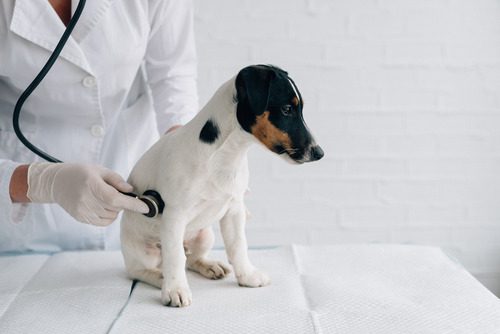Dog Respiratory Illness: Recognizing Symptoms and Seeking Care
When our canine companions start to cough or show signs of breathing trouble, it’s natural for us to worry. Understanding what these symptoms can mean and when to seek veterinary care is essential for every pet owner. This blog aims to shed light on common respiratory illnesses in dogs, how to recognize the early signs, and the importance of professional veterinary attention. At Lane Veterinary in Hinsdale, IL, we’re committed to providing the best care for your pets. If you notice any respiratory symptoms in your dog, call us at (630) 320-6644 or book an appointment online.

Recognizing the Symptoms of Respiratory Illness in Dogs
Dogs, much like humans, can suffer from a variety of respiratory illnesses. These can range from mild cases, like the common cold, to more severe conditions such as pneumonia or canine influenza. Knowing the signs to look out for can help ensure your dog receives the care they need as quickly as possible.
- Coughing: One of the first and most common signs of a respiratory issue. A cough can vary from a dry, hacking cough to a wet cough that may indicate the presence of mucus or fluid in the lungs.
- Sneezing and Nasal Discharge: While sneezing occasionally is normal, frequent sneezing accompanied by nasal discharge can be a sign of respiratory infection.
- Difficulty Breathing: Pay attention to any changes in your dog’s breathing patterns. If they seem to be struggling, breathing heavily, or panting without a clear reason (like exercise), it’s time to seek veterinary care.
- Lethargy: A dog that is usually playful but suddenly becomes uninterested in activity or appears tired may be feeling unwell.
- Loss of Appetite: A decrease in appetite can be another indicator of illness, especially if combined with any of the above symptoms.
When to Seek Veterinary Care
It’s crucial to monitor these symptoms and contact your veterinarian if they persist or worsen. Early detection and treatment can prevent more serious complications and ensure a quicker recovery for your pet.
Common Causes of Respiratory Illness in Dogs
Several factors can contribute to respiratory issues in dogs, including infectious agents like viruses and bacteria, environmental factors, and underlying health conditions.
- Canine Influenza and Kennel Cough: Highly contagious illnesses that can spread quickly in social settings like dog parks, boarding facilities, and shelters.
- Allergies: Just like humans, dogs can be allergic to a variety of environmental factors, including pollen, dust, and mold, leading to respiratory symptoms.
- Heartworm Disease: This serious condition can lead to severe lung disease and heart failure in dogs. It’s transmitted by mosquitoes, making prevention critical.
Understanding these causes can help pet owners take preventative measures, such as keeping vaccinations up to date and maintaining a clean, allergen-free environment.
Preventing Respiratory Illnesses
Protecting your dog from respiratory illnesses is an essential part of pet care. While it’s impossible to prevent every illness, there are several steps you can take to significantly reduce your dog’s risk of becoming sick.
- Vaccinations: Keeping up with your dog’s vaccinations is crucial. Vaccines protect against common and serious respiratory illnesses like canine influenza and Bordetella (often associated with kennel cough). Consult with your veterinarian at Lane Veterinary to ensure your dog’s vaccinations are up-to-date according to their specific needs and lifestyle.
- Parasite Prevention: Heartworms can cause serious respiratory issues in dogs. Monthly preventatives are highly effective and should be used year-round. Your veterinarian can recommend the best heartworm prevention product for your dog.
- Avoiding High-Risk Areas: If there’s an outbreak of a contagious illness like canine influenza in your area, avoid dog parks, kennels, and other areas where dogs congregate. Social distancing for dogs can be just as important as it is for humans in preventing the spread of disease.
- Maintain a Clean Environment: Regularly cleaning your dog’s bedding, toys, and feeding areas can help minimize the risk of respiratory illnesses. Use pet-safe cleaning products to disinfect your home and your pet’s belongings.
- Good Nutrition and Exercise: A healthy diet and regular exercise can strengthen your dog’s immune system, making them less susceptible to illnesses. Ensure your dog has a balanced diet suited to their age, size, and health needs, and provide plenty of opportunities for physical activity.
- Monitor and Minimize Allergens: For dogs sensitive to environmental allergens, minimizing exposure to things like pollen, dust, and mold can reduce the risk of respiratory issues. Air purifiers, regular vacuuming, and keeping windows closed during high pollen days can help.
- Stress Reduction: Stress can weaken your dog’s immune system, making them more susceptible to illness. Provide a stable environment, regular routines, and plenty of affection to help keep your dog relaxed and happy.
The Role of Your Veterinarian in Diagnosing and Treating Respiratory Illness
When you bring your dog to Lane Veterinary due to respiratory symptoms, our team will perform a thorough examination to diagnose the issue. This may include a physical examination, listening to your dog’s lungs, and possibly further diagnostic tests such as X-rays or blood tests. Diagnostic Testing helps in identifying the specific cause of the respiratory symptoms, enabling targeted treatment. Depending on the diagnosis, treatment may involve medications such as antibiotics (for bacterial infections), antivirals (for viral infections), or other medications to help alleviate symptoms and support recovery. It’s important to follow your veterinarian’s treatment plan closely and complete any prescribed medication courses, even if your dog starts to show improvement before the medication is finished.
The Importance of Follow-Up Care
After initial treatment, follow-up visits may be necessary to ensure your dog is recovering as expected and to adjust treatment plans if needed. Keeping these appointments is crucial for your dog’s health and recovery.
How to Support Your Dog During Recovery
While your dog is recovering from a respiratory illness, there are several ways you can support their comfort and healing process.
- Ensure your dog has a quiet place to rest away from busy household areas.
- Encourage your dog to drink water to stay hydrated, which is important for recovery.
- Offer a balanced diet to support their energy needs during recovery. Your veterinarian may recommend specific foods if your dog has a reduced appetite.
Offering gentle care and monitoring your dog’s symptoms closely during this time can make a big difference in their recovery.
A Healthier Path for Your Canine Companion
Recognizing the signs of respiratory illness in dogs and understanding when to seek veterinary care are key steps in ensuring the health and well-being of your furry family member. At Lane Veterinary in Hinsdale, IL, we’re here to provide expert care and guidance every step of the way. If you’re concerned about your dog’s respiratory health, don’t hesitate to call us at (630) 320-6644 or book an appointment online. Together, we can keep your dog healthy, happy, and breathing easily.
Recent Posts
About Us
Choosing a vet means entrusting your pet’s care and well-being to capable hands. Lane Veterinary strives to be a lifetime vet for you and your family, being the people you can always lean on for support and guidance. As a privately owned practice, we stand to give people and their pets the one-on-one care and attention they deserve in a calm and comfortable setting.
